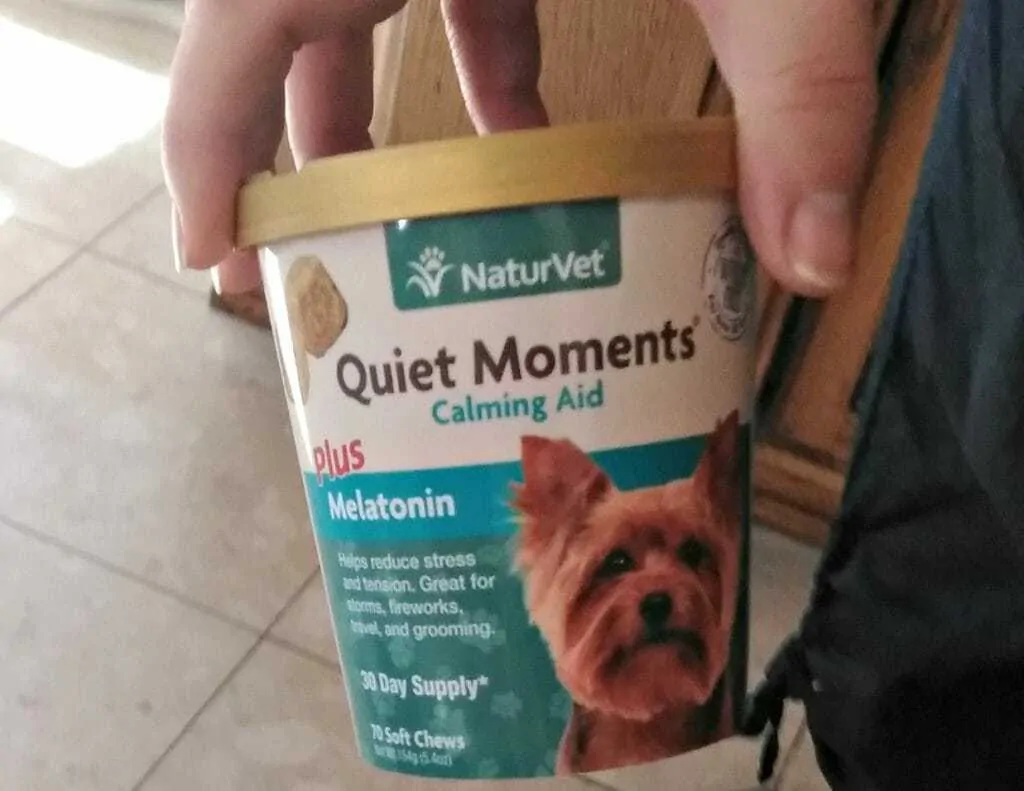Contents
What Is Melatonin?
Melatonin is a naturally produced hormone that is created by our pineal glands when we are in darkness. Melatonin is the result of the amino acid tryptophan being converted to serotonin, which is known as a “happy” neurotransmitter, which is then converted to acetylation, methylation, and finally melatonin. Melatonin is produced in both human and dog bodies. When it’s produced regularly, melatonin is essentially in charge of telling our bodies when it’s time to sleep and be awake.
Melatonin is naturally produced in our bodies to help us sleep. Nickel does not personally have this problem, as shown here, but she benefits from melatonin’s other uses.
When you have too little you may find yourself struggling with insomnia which can greatly affect your health over time. Melatonin lessens in the body as we get closer to morning because light signals the body to slow down melatonin production which wakes us up. It’s an important hormone for helping us to keep our circadian rhythm and sleep healthy and regular. If you’ve ever gone without consistent sleep then you know how horrible the feeling is! Outside of helping us and our dogs sleep, melatonin can be very calming and helps with a variety of health problems.
Nickel looking nervous while she lays on the couch. She gets very anxious when it storms so we give her melatonin to calm her nerves.
Melatonin Uses In Dogs
Melatonin has a plethora of uses in dogs and can be very beneficial to their health. Melatonin is considered a generally safe supplement for dogs when given in the right dosage. However, we always recommend checking with your veterinarian about your dog’s specific health concerns and if melatonin might be right for your dog.
- Anxiety & Depression: Melatonin has a very calming sensation that can soothe a stressed out, anxious, or agitated dog. Anxiety is one of the most common reasons that a dog may benefit from melatonin as it gives the body signals to prepare for sleep. If your dog has ongoing anxiety or depression, melatonin may be something very beneficial for their day to day life.
- Loud Noises: Many dogs are very scared of loud, sudden noises such as storms, fireworks and even vacuuming. They may not have an anxious personality usually, but these intensely loud noises can scare even the calmest pooch! If this is your dog consider sporadic melatonin supplements before these noises occur if possible or during if the noise is unexpected.
- Alopecia: Alopecia, sometimes known as flank alopecia, is when dogs develop bald patches on either side of their abdomen. This condition is not considered hazardous to the dog, but some experts like Dr. Maria Haynes, claim that melatonin may thicken hair and help the bald patches to be less noticeable. Scientists ultimately don’t know how melatonin helps with hair loss, however melatonin is considered low risk so it may be worth a try to thicken your dog’s hair.
- Vet Visits & Separation Anxiety: Dogs can be very afraid of vet visits, being separated from their owners, and staying with a pet sitter or family member while you are away. Melatonin can help to mellow your dog out for these occasions which will ultimately lead to a happier dog and owner!
- Sleep Issues: Since melatonin is naturally produced in the body to help us sleep, it can definitely be helpful to work against insomnia or an irregular sleep schedule. Older dogs in particular may struggle more with their sleep schedule and melatonin may help your dog to fall asleep easier. Other temporary issues like jet lag or a disruption of your dog’s sleep schedule, like surgery or moving homes, may be eased with melatonin.
The moment we brought out Nickel’s melatonin supplement she was excited! These help her stay calmer whenever there is additional stress for her, such as storms or persistent loud noise.
How Melatonin Supplements Have Helped Our Dog
Nickel is a very rambunctious, happy dog overall, but even she struggles with the occasional anxiety. We’ve found as needed melatonin treats to be very helpful for when she is very nervous. The most common reasons we give her a melatonin treat is for heavy rain, thunderstorms, and other loud household noises. She is fearful of brooms, mops, and the noise vacuums make so I tend to give her one before I start bringing out the “scary sticks” or making a lot of noise with the vacuum. Before giving her a melatonin treat I would put her in my bedroom to minimize the noise and her line of sight, but she would inevitably be curled up in a corner of the room with her tail in between her legs due to fear. Now that I give her melatonin I come into a room with a dog who is mostly calm and relaxed on a blanket. It makes a huge difference! Previously when I was finished vacuuming, she would be nervous to come out of my bedroom. Now she happily jumps off my bed and walks into the kitchen with little to no fear. The melatonin has made a huge improvement in her demeanor and this weekly cleaning no longer terrifies her. It’s such a relief to see her significantly calmer and I feel less guilty when I am cleaning as a result.
Melatonin makes Nickel calmer and, perhaps, a little dopier but doesn’t seem to make her drowsy at all. She comes across as mellow and more chill. I’m so happy to have found melatonin for her as her stress levels remain much lower during situations that are usually high stress for her.
A very stress-free dog who is sleeping happily. Melatonin can help a dog who is having trouble sleeping through the night which is amazing for your dog’s health. Photo by Kenn W. Kiser at Morguefile.com
Risk Factors With Melatonin Use
As with anything there are possible risk factors, however melatonin is generally considered a pretty low risk supplement for dogs. Whenever you give your dog something new it’s wise to watch for any type of allergic reaction so keep a close eye on your dog the first time they try melatonin out. It’s very important to choose an appropriate dosage of melatonin to give you dog. Many of the melatonin products I’ve looked at include a chart on the back which is typically done by weight but we recommend checking with your veterinarian to make sure the melatonin dosage is appropriate for them specifically.
Certapet recommends that you watch out for xylitol in any melatonin supplements as it’s known to be toxic to dogs. Other than avoiding xylitol, there are relatively few risks to taking melatonin and it’s very unlikely to cause serious side effects.
The most common side effects include:
- Drowsiness or confusion
- An upset stomach or cramps
- Changes in fertility
- Accelerated heart rate
Always contact your vet as soon as possible if your dog experiences any allergic or otherwise negative reaction!
What Dogs Should Probably Avoid Melatonin Altogether?
Always check with your veterinarian before administering any supplements to your dog, but the most high risk dogs for consuming melatonin are:
- Diabetic Dogs: Melatonin may cause insulin resistance in a diabetic animal.
- Dogs Under 12 Weeks: Many melatonin supplements advised giving them to dogs 12 weeks and older so I would recommend avoiding melatonin use for such a young dog.
- Dogs With Cushing’s Disease: Melatonin in a dog with cushing’s disease is very controversial. On one hand it may help with the increased stress from their heightened adrenal glands by mellowing them out and it is also a gentler alternative to traditional medication. However, it hasn’t been extensively tested how melatonin may affect their adrenal glands over time.
We enjoy giving Nickel melatonin in the form of a treat as she is more than excited to take it and she then benefits from the calming effect it has on her. These treats have worked out very well for us!
Ways To Give Your Dog Melatonin
- Melatonin Treats!: We use Naturvet Quiet Moments Calming Aid Plus Melatonin for Nickel and it’s worked out beautifully. She is excited to have a treat and we don’t have to worry about hiding a pill inside food. These are probably best for as needed supplements since they would be more expensive and possibly unhealthy all the time as they are treats.
- Melatonin Tablets: These might be best for a dog who takes melatonin daily as you can stick a tablet mixed in with their dog food rather than overfeeding them with treats.
- Melatonin Drops & Chewables: These might be a more appetizing alternative if your dog is picky about taste and doesn’t like a pill or tablet.
- Melatonin Pills: Pills would be a great option for more frequent doses.You might mix these in with wet dog food to help your dog take them more easily.
All in all, I certainly recommend looking into melatonin for your dog if they experience any sleep, mood, or fear issues. Giving these to Nickel as needed as been very comforting to her and to us as we dislike seeing her so scared. Check with your vet and see what they recommend for your dog to take dosage wise. If for some reason melatonin is not an option, consider looking at this article for other calming supplements for your precious pooch!





